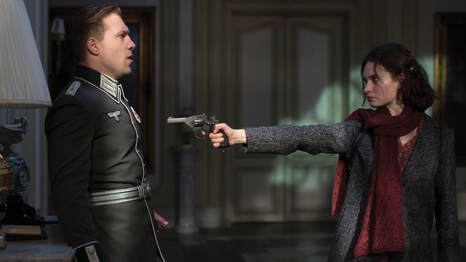Film ReviewsThe Exception: Rose Color Nazi Glasses
Aug 23, 2017 Anchorage Press
|
|

The Exception, directed by David Leveaux,is based on the novel “The Kaiser’s Last Kiss” by Alan Judd about the last days of the exiled Monarch Kaiser Wilhelm II of Germany. The story takes place in 1940, during World War II, just as Hitler is reaching the apex of power and is turning the country inside out, using extreme vetting to oust anyone who may post a threat to him, and that includes the previous monarchy. The Kaiser is played by Christopher Plummer, whose acting is still tiptop. The plot focuses on Captain Stefan Brandt (Jai Courtney) and his assignment to guard the Kaiser from a perceived threat of assassination by the allies. The Third Reich captain falls for one of the servant girls, Meike de Jong (Lily James). The dynamics shift when Brandt finds out that Maike is a Jew.
The Exception is as formulaic and predictable as can be. It’s a romantic drama set in WWII about a Nazi falling for a Jew…hardly a new concept, but on the spectrum of say, Disney on the sugarcoated side, and The Night Porter about a sadomasochistic relationship between a concentration camp victim and her Nazi oppressor, on the other, The Exception is on the Disney PG-13 side, even with full-frontal nudity of the pair and some violence.
The Exception treats the horrific historical realities of the Holocaust as mere suggestions of contextual plot, thus minimizing the horror, inhumanity, and affront to human dignity. The film is also very sympathetic to Nazis, as if to say, “See, Nazis are people too; they’re nice underneath, and their actions or lack thereof are excusable because they, too, fall in love.” In order words, the underlying current of “the banality of evil” described by Hannah Arendt in her observations of Adolf Eichmann’s trial is freely flowing in The Exception. The character of the Kaiser himself is seen through a lens of disproportionate compassion—forget that he was responsible for unleashing World War I, and that he prioritized his bellicose stance over the economic wellbeing of his people. In The Exception, the Kaiser is like an aged Captain von Trapp from The Sound of Music; this is not a reflection on Plummer, it’s a reflection on the directorial course.
Aesthetically, the film is beautifully executed. The cinematography and the sets are gorgeous and invoke the times, its decor, texture, and fashion. The soundtrack does its job and helps the plot move along, and there are even some cinematic tools that are nicely leveraged though the captain’s sleuthing skills. In addition to Plummer’s performance, the additional casts delivers compelling characters. Janet McTeer plays Princess Hermine, the Kaiser’s wife, with the finesse of a self-possessed Lady Macbeth. Ben Daniels as Colonel Sigrud von Ilsemann, the Kaiser’s right hand man, is a consistent and strong caretaker. And, last but not least is Eddie Marsan’s performance of Heinrich Himmler, the Third Reich’s second-worst architect and executioner. Marsan delivers a powerful performance with very few words, and is perhaps the best reason to watch this film. The Exception is Leveaux’s directorial debut and it seems that in his desire to succeed he fell into the trap of trying to create a film that is pleasing and romantic, but in doing so, Leveaux misses an opportunity to be relevant.
Rated R
Showing on Monday August 21 2017 7:45 PM (107 Minutes)
The Exception is as formulaic and predictable as can be. It’s a romantic drama set in WWII about a Nazi falling for a Jew…hardly a new concept, but on the spectrum of say, Disney on the sugarcoated side, and The Night Porter about a sadomasochistic relationship between a concentration camp victim and her Nazi oppressor, on the other, The Exception is on the Disney PG-13 side, even with full-frontal nudity of the pair and some violence.
The Exception treats the horrific historical realities of the Holocaust as mere suggestions of contextual plot, thus minimizing the horror, inhumanity, and affront to human dignity. The film is also very sympathetic to Nazis, as if to say, “See, Nazis are people too; they’re nice underneath, and their actions or lack thereof are excusable because they, too, fall in love.” In order words, the underlying current of “the banality of evil” described by Hannah Arendt in her observations of Adolf Eichmann’s trial is freely flowing in The Exception. The character of the Kaiser himself is seen through a lens of disproportionate compassion—forget that he was responsible for unleashing World War I, and that he prioritized his bellicose stance over the economic wellbeing of his people. In The Exception, the Kaiser is like an aged Captain von Trapp from The Sound of Music; this is not a reflection on Plummer, it’s a reflection on the directorial course.
Aesthetically, the film is beautifully executed. The cinematography and the sets are gorgeous and invoke the times, its decor, texture, and fashion. The soundtrack does its job and helps the plot move along, and there are even some cinematic tools that are nicely leveraged though the captain’s sleuthing skills. In addition to Plummer’s performance, the additional casts delivers compelling characters. Janet McTeer plays Princess Hermine, the Kaiser’s wife, with the finesse of a self-possessed Lady Macbeth. Ben Daniels as Colonel Sigrud von Ilsemann, the Kaiser’s right hand man, is a consistent and strong caretaker. And, last but not least is Eddie Marsan’s performance of Heinrich Himmler, the Third Reich’s second-worst architect and executioner. Marsan delivers a powerful performance with very few words, and is perhaps the best reason to watch this film. The Exception is Leveaux’s directorial debut and it seems that in his desire to succeed he fell into the trap of trying to create a film that is pleasing and romantic, but in doing so, Leveaux misses an opportunity to be relevant.
Rated R
Showing on Monday August 21 2017 7:45 PM (107 Minutes)